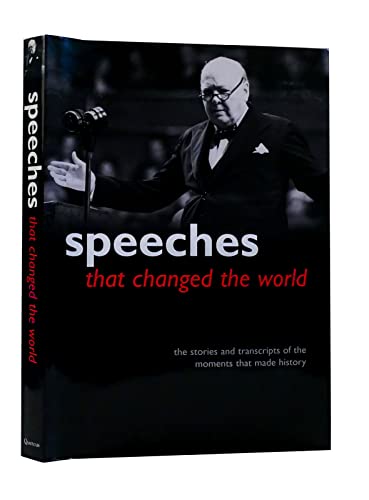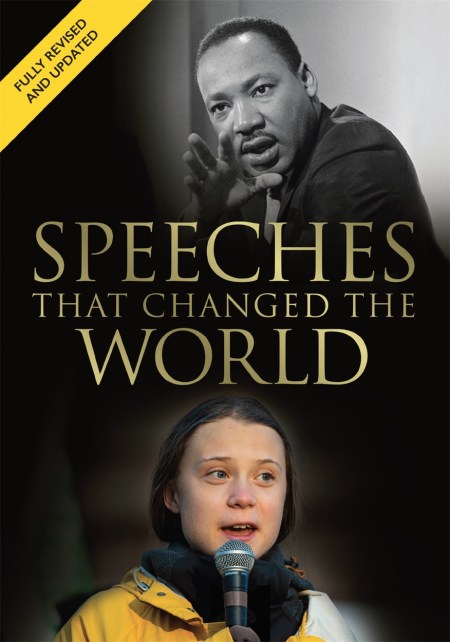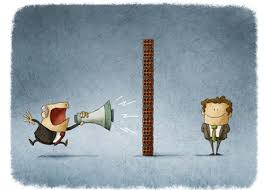Speeches That Changed the Whole World
Speeches that changed the world are powerful, influential and have made a lasting impact on society. From the iconic words of martin luther king jr.’s “i have a dream” speech to winston churchill’s rallying cry, “we shall fight on the beaches,” speeches hold the power to inspire, motivate, and ignite change.
These influential speeches have shaped history, influencing the course of events, and leaving an indelible mark on our collective consciousness. They have the ability to connect on an emotional level, uniting people and sparking movements. Through the power of oratory, speeches have been able to break barriers, challenge norms, and create a vision for a better future.
We will explore some of the most impactful speeches that have had a profound and lasting effect on the world.

Credit: www.abebooks.com
Power Of Words: How Speeches Can Shape History
Discover the remarkable influence of powerful speeches that have changed the course of history. Experience the transformative power of words and how they shape the world we live in today.
In the realm of history, there exist certain speeches that have transcended time, leaving an indelible mark on societies and shaping the course of events. These influential speeches have the power to ignite revolutions, instill hope, and challenge the status quo.
They are capable of resonating with people from all walks of life, cutting through barriers of language, culture, and time. The impact they have had is immeasurable, leaving an undeniable trail of transformation in their wake.
Impact Of Influential Speeches In History:
- Inspiring action: Powerful speeches have the ability to inspire individuals and communities to take action. They can ignite a sense of passion and purpose within listeners, urging them to fight for a cause or make a positive change. Through rhetorical devices such as repetition, metaphors, and emotional appeal, speakers can rally support and mobilize masses.
- Shifting public opinion: Well-articulated speeches wield the power to shift public opinion on critical issues. By appealing to reason, logic, and empathy, speakers can challenge deeply ingrained beliefs and prejudices. They can provide a new perspective, allowing society to reflect and reassess its stance on specific matters.
- Driving social change: Historical speeches have been catalysts for significant social change, toppling oppressive regimes, and dismantling discriminatory systems. Iconic figures like martin luther king jr., mahatma gandhi, and nelson mandela used their words as weapons of peace, breaking down the walls of injustice and fostering a more equal and inclusive world.
- Uniting communities: Speeches have the ability to unite communities, transcending divisions and fostering a collective spirit. When charismatic leaders address a diverse audience, their words can create a shared sense of identity and purpose, fostering unity amidst diversity.
- Preserving historical memory: Influential speeches serve as cultural artifacts, preserving the memory and legacy of historical events. By examining the words spoken during critical moments in history, we gain insight into the hopes, aspirations, and challenges faced by past generations.
Historical Significance And Context Of Powerful Speeches:
- Contextual understanding: To truly appreciate the impact of influential speeches, it is crucial to understand the historical context in which they were delivered. Historical events, social dynamics, and cultural nuances provide a backdrop against which these speeches are understood and interpreted.
- Symbolic moments: Powerful speeches are often delivered at pivotal moments in history, amplifying their significance. They capture the collective sentiment and become symbolic of a larger movement or shift in societal consciousness.
- Rhetorical techniques: The art of persuasion lies at the heart of powerful speeches. Rhetorical techniques such as emotional appeal, logical reasoning, and vivid imagery are employed to captivate audiences and leave a lasting impression.
- Oral tradition: In many societies, oral tradition has played a vital role in preserving history and passing down knowledge. Through powerful speeches, stories are shared, values are imparted, and lessons from the past are etched into the collective memory.
These powerful speeches have left an everlasting imprint on the pages of history, reminding us of the transformative power of words. They serve as a testament to the strength of human conviction and the capacity for change. Let us revisit these inspiring moments, explore the minds behind the words, and reflect on the profound impact they continue to have on our world today.
Historical Speeches: Catalysts For Change
Discover the power of historical speeches that have shaped our world, serving as catalysts for change. These influential speeches have left lasting impacts and continue to inspire generations to take action and make a difference. From martin luther king jr.
‘s “i have a dream” to nelson mandela’s inauguration address, these transformative speeches have the ability to ignite revolutions and transform societies.
Throughout history, there have been several powerful speeches that have stirred the hearts and minds of millions, ultimately leading to significant changes in society. These speeches, delivered by extraordinary individuals, have served as catalysts for change, igniting movements and inspiring others to fight for justice, freedom, and equality.
Below, we explore three iconic historical speeches that made a lasting impact:
Martin Luther King Jr.’S “I Have A Dream”
- Martin luther king jr.’s speech, “i have a dream,” delivered on august 28, 1963, during the march on washington for jobs and freedom, became a defining moment in the american civil rights movement.
- This historic speech called for an end to racial segregation and discrimination based on race, emphasizing equality and justice for all americans.
- Bullet points:
- King expressed his dreams of a future where racial harmony prevailed, where individuals were judged by their character, and where racial disparities were eradicated.
- He highlighted the urgency to address systemic racism and demanded change, urging his audience to join him in the fight for equality.
- Through his powerful use of language, king inspired hope and ignited passion, leaving an indelible mark on the consciousness of the american people.
Nelson Mandela’S “I Am Prepared To Die”
- Nelson mandela’s speech, “i am prepared to die,” delivered from the dock at the rivonia trial on april 20, 1964, played a pivotal role in the fight against apartheid in south africa.
- Facing the possibility of the death penalty, mandela used this speech to champion the cause of freedom and to expose the injustice of apartheid.
- Bullet points:
- Mandela outlined the history of oppression in south africa and his organization’s struggle against apartheid.
- He admitted that the african national congress had been forced to take up arms in response to rampant state violence and repression.
- Mandela articulated his dedication to the ideals of democracy, equality, and freedom, closing his speech with the famous words, “it is an ideal for which i am prepared to die.”
Mahatma Gandhi’S “Quit India”
- Mahatma gandhi’s speech, “quit india,” delivered on august 8, 1942, played a pivotal role in india’s struggle for independence from british colonial rule.
- This impassioned call to action sparked the quit india movement, a nonviolent resistance movement demanding an end to british colonial rule in india.
- Bullet points:
- Gandhi called upon the indian people to unite and stand for their rights, emphasizing the power of nonviolence as a means of achieving freedom.
- He inspired the masses by reminding them that they possessed the strength to liberate themselves from the shackles of oppression.
- Gandhi’s speech provoked a wave of civil disobedience and protest, setting india on the path to eventual independence.
These historical speeches exemplify the power of words in spurring societal change. Through their unwavering conviction, eloquence, and ability to connect with others, martin luther king jr. , nelson mandela, and mahatma gandhi left an indelible legacy, reminding us of the transformative impact that voices can have on shaping the world we inhabit.
Inspiring Hope Amidst Adversity: Iconic Speeches
Discover the power of iconic speeches that changed the world and inspired hope amidst adversity. These influential addresses have left an indelible mark on history, reminding us of the strength of words in shaping our future.
In challenging times, words have the power to inspire, unite, and ignite change. Throughout history, there have been iconic speeches that have captivated hearts, instilled hope, and impacted the course of nations. Let’s delve into three such transformative speeches that have shaped the world.
Winston Churchill’S “We Shall Fight On The Beaches”
- Winston churchill’s “we shall fight on the beaches” speech delivered on june 4, 1940, showcased his unwavering determination and resilience in the face of imminent nazi invasion during world war ii. The speech rallied the british people and provided solace during the darkest hours. It was a rallying call to never surrender and fight for freedom. Key points:
- Churchill emphasized the indomitable spirit of the british nation: Even if britain’s island fortress stood alone, they would defend their freedom at all costs.
- He acknowledged the gravity of the situation, making clear that the war would be a struggle, but one they were ready to undertake with unwavering resolve.
- Churchill’s speech invoked a sense of unity and resilience, reinforcing the belief that victory was possible even in the face of overwhelming odds.
John F. Kennedy’S “Ask Not What Your Country Can Do For You”
- John f. kennedy’s inaugural address on january 20, 1961, resonated with millions and inspired a generation to actively participate in the betterment of their nation. The famous line, “ask not what your country can do for you; ask what you can do for your country,” encapsulated the essence of civic duty, encouraging citizens to contribute to the greater good. Key points:
- Kennedy called upon the american people to unite in the pursuit of progress and to move beyond self-interest.
- He emphasized the responsibilities each citizen holds towards their country, underlining the importance of shared sacrifice and service.
- By shifting the focus from entitlement to active participation, kennedy’s speech sparked a sense of community and invoked a call to action.
Abraham Lincoln’S Gettysburg Address
- Abraham lincoln’s gettysburg address, delivered on november 19, 1863, after the battle of gettysburg, is regarded as one of the most famous speeches in american history. In just a few minutes, lincoln eloquently conveyed the necessity of honoring the sacrifice of those who fought and died while reminding the nation that a united future was essential. Key points:
- Lincoln highlighted the significance of preserving the union and the ideals of equality and freedom upon which the nation was built.
- He reminded the audience of the sacrifices made by soldiers and called on the living to ensure their efforts were not in vain.
- The gettysburg address redefined the purpose of the war and inspired a renewed commitment to the nation’s founding principles.
These iconic speeches by winston churchill, john f. kennedy, and abraham lincoln serve as timeless reminders of the human spirit’s resilience and the power of words to inspire hope even in the most challenging times. They continue to echo through history, leaving a lasting impact on generations to come.
Embracing Equality: Speeches Empowering Marginalized Communities
Discover the empowering speeches that have had a monumental impact on marginalized communities, inspiring them to embrace equality in a world-changing way. These transformative speeches continue to resonate and drive social change, creating a better future for all.
Malala yousafzai’s address to the united nations youth assembly:
- Malala yousafzai, a brave advocate for girls’ education, delivered a powerful speech to the united nations youth assembly.
- In her address, malala highlighted the importance of education and its potential to empower marginalized communities.
- She spoke passionately about the rights of girls to receive an education, emphasizing that education is a weapon against inequality and extremism.
- Malala’s speech inspired action around the world, leading to increased awareness and support for girls’ education globally.
Susan b. anthony’s “women’s rights to the suffrage”:
- Susan b. anthony, a prominent suffragist, delivered a compelling speech advocating for women’s right to vote.
- In her passionate address, anthony emphasized that women deserved the same political rights as men, arguing for gender equality and social justice.
- She eloquently expressed that women should not be denied the fundamental right to vote based on their gender.
- Anthony’s speech played a significant role in the women’s suffrage movement and paved the way for women’s rights advancements.
Harvey milk’s “hope speech”:
- Harvey milk, the first openly gay elected official in california, delivered an inspiring speech known as the “hope speech”.
- Milk’s speech embraced equality and empowerment for the lgbtq+ community, urging individuals to come out and live authentically.
- He encouraged marginalized communities to fight for their rights and to believe in the power of hope.
- Milk’s influential words continue to resonate today, reminding us of the importance of embracing equality and striving for acceptance.
These speeches have formed a legacy of empowerment and advocacy for marginalized communities, igniting change and inspiring countless individuals to fight for equality. Through their powerful words, individuals like malala yousafzai, susan b. anthony, and harvey milk have left a lasting impact on society, reminding us of the importance of embracing diversity and uplifting those who have been marginalized.
Speeches In Times Of Crisis: Mobilization And Unity
Discover the transformative power of impactful speeches in times of crisis, as they inspire mobilization and foster unity. Uncover the speeches that have changed the world and left an indelible mark on history.
Franklin D. Roosevelt’S “The Only Thing We Have To Fear Is Fear Itself”
Franklin d. roosevelt’s iconic speech, “the only thing we have to fear is fear itself,” delivered during his inauguration in 1933, stands as a powerful example of leadership in a time of crisis. In the midst of the great depression, roosevelt inspired a nation struggling with fear and uncertainty.
Here are key points from his transformative speech:
- Fear as the greatest obstacle: Roosevelt emphasized that fear itself, rather than any external threat, poses the greatest danger to the nation’s well-being.
- Call for unity: He urged americans to come together, stating that unity and collective action were necessary to confront the challenges faced during that time.
- Courage and determination: Roosevelt emphasized the importance of courage and determination in overcoming adversity, motivating citizens to face the crisis head-on.
- Confidence in the nation’s future: Through his words, roosevelt instilled a sense of hope and a belief that the country would rise above the challenges, signaling his unwavering confidence in the american people.
Barack Obama’S “A More Perfect Union”
Barack obama’s speech, “a more perfect union,” delivered during his 2008 presidential campaign, addressed racial tensions and aimed to foster unity within the united states. This impactful speech resonated with both supporters and critics alike. Here are the key aspects highlighted in obama’s address:
- Acknowledgment of racial divisions: Obama did not shy away from addressing the deeply rooted racial divisions prevalent in american society.
- Call for unity amidst diversity: He emphasized the strength that comes from embracing diversity and the importance of fostering mutual understanding and respect.
- An opportunity for progress: Obama saw the challenges of racial tensions as an opportunity for the nation to come together in pursuit of a more equitable and inclusive future.
- The realization of america’s promise: Obama’s speech painted an optimistic picture of the country’s potential to overcome its historical racial divisions and move towards a truly united america.
Ronald Reagan’S “Tear Down This Wall”
Ronald reagan’s speech at the brandenburg gate in berlin, known as “tear down this wall,” has become one of the most significant speeches in modern history. Delivered in 1987, reagan’s words played a pivotal role in the eventual fall of the berlin wall.
The key points from this influential speech include:
- A challenge to the soviet union: Reagan boldly called upon the soviet leader, mikhail gorbachev, to dismantle the barrier that divided east and west berlin.
- Symbol of freedom: The speech positioned the berlin wall as a symbol of oppression and underscored the importance of freedom in the face of communism.
- Hope for a united europe: Reagan expressed optimism for a future where east and west germany would be reunited and europe would be free from the shackles of division.
- The power of democracy: The speech reinforced the idea that democracy and individual liberty were the ultimate drivers of progress and peace.
These speeches mark defining moments in history, demonstrating the influence of strong leadership and the power of words to mobilize nations and inspire unity in times of crisis. They serve as timeless reminders of the resilience and strength of the human spirit.
Inspiring Change Through Advocacy: Speeches For Social Justice
Discover the power of speeches that changed the world and explore how advocacy can inspire transformative change for social justice. Explore the book “inspiring change through advocacy: speeches for social justice” and be inspired by the words that have shaped history.
Elizabeth Cady Stanton’S “Declaration Of Sentiments”
- In 1848, elizabeth cady stanton delivered the powerful “declaration of sentiments” at the seneca falls convention, which was a seminal event in the fight for women’s rights.
- This speech called for women’s suffrage and demanded that women be granted equal rights and opportunities, challenging the male-dominated society of that time.
- Stanton employed persuasive arguments and impassioned language to rally support for the women’s rights movement, inspiring many to join the cause.
- Key points from her speech include:
- Women should have the right to vote, hold property, and pursue education.
- The oppressive social norms and legal restrictions placed on women should be abolished.
- Women should be seen as equal citizens with the same rights and privileges as men.
- With her courageous speech, elizabeth cady stanton sparked a movement that would eventually lead to significant advancements in women’s rights.
Martin Luther King Jr.’S “Letter From Birmingham Jail”
- In 1963, martin luther king jr. Penned his famous “letter from birmingham jail” while incarcerated for protesting against racial segregation.
- This eloquent letter was a response to criticism from eight white clergymen who urged king to cease his demonstrations.
- King’s letter skillfully argued against the injustice of racial segregation, calling for immediate action to address civil rights issues.
- Key points from his letter include:
- Nonviolent direct action is necessary to force society to confront and dismantle institutionalized racism.
- Injustice anywhere is a threat to justice everywhere, and it is every citizen’s duty to fight for equality.
- Civil rights activists were not the instigators of tension, but rather the catalysts for positive change.
- Urgency in addressing racial inequality is crucial to prevent further suffering and division in society.
- Martin luther king jr.’s powerful words in the “letter from birmingham jail” inspired countless individuals to join the civil rights movement and continue his fight for equality.
Sojourner Truth’S “Ain’T I A Woman?”
- In 1851, sojourner truth delivered her iconic speech titled “ain’t i a woman?” At the women’s rights convention in akron, ohio.
- This powerful speech aimed to dismantle gender and racial stereotypes, advocating for the rights of african american women.
- Key points from her speech include:
- Women are just as capable and deserving of rights as men, regardless of their race.
- African american women face unique challenges and discrimination due to their intersectional identities.
- Society’s perception of femininity is flawed, as it fails to recognize the strength and resilience of women like truth.
- Truth called for unity among women, urging them to stand together to fight for their rights.
- Sojourner truth’s impassioned plea for equality and her skillful oratory have made her speech a lasting symbol of the ongoing struggle for social justice.
The Power Of Diplomacy: Speeches For Peace
‘the power of diplomacy: speeches for peace’ is a collection of influential speeches that have had a profound impact on the world. These speeches have shaped history, from inspiring movements to resolving conflicts, showcasing the transformative power of diplomacy and communication.
Nelson mandela’s inaugural address:
- Nelson mandela delivered his inaugural address in 1994, marking the end of apartheid in south africa and the beginning of a new era.
- In his speech, mandela emphasized the importance of unity, reconciliation, and forgiveness as the nation moved forward.
- He called for an end to discrimination and the building of a society where everyone is treated equally.
- Mandela’s words inspired hope and unity, laying the foundation for a peaceful and inclusive south africa.
John f. kennedy’s “peace speech” at the american university:
- In 1963, john f. kennedy delivered a powerful speech at the american university, advocating for peace during the cold war.
- Kennedy emphasized the need for diplomacy and understanding between the united states and the soviet union.
- He proposed a cessation of nuclear weapons testing and expressed his desire for a world free from the threat of nuclear war.
- Kennedy’s speech highlighted the importance of dialogue and compromise in achieving global peace.
Dwight d. eisenhower’s “atoms for peace”:
- Dwight d. eisenhower’s “atoms for peace” speech, delivered in 1953, aimed to ease cold war tensions and promote peaceful uses of atomic energy.
- Eisenhower called for a shift in perception towards atomic energy, suggesting that it could be harnessed for beneficial purposes rather than solely destructive ones.
- He encouraged international cooperation in the development of peaceful atomic energy programs.
- Eisenhower’s “atoms for peace” speech laid the groundwork for international agreements and collaborations in the peaceful use of nuclear energy.
Speeches can have a profound impact on the world, especially when they advocate for peace and diplomacy. Nelson mandela’s inaugural address, john f. kennedy’s “peace speech” at the american university, and dwight d. eisenhower’s “atoms for peace” exemplify the power of words in shaping a peaceful future.
These speeches inspire unity, advocate for understanding between nations, and promote the peaceful use of atomic energy. Through their powerful messages, these speeches have helped change the world and inspire generations to strive for peace.
Technology And Communication: Speeches In The Digital Age
Discover the power of technology and communication in the digital age with “speeches in the digital age: speeches that changed the world”. Explore how groundbreaking speeches have shaped our society and learn how technological advancements have influenced communication on a global scale.
In today’s ever-evolving digital landscape, technology and communication have become intertwined, shaping the way we connect, share ideas, and inspire change. Three influential figures have delivered speeches that not only captivate audiences but also pivot the course of technological advancements.
Let’s explore these transformative speeches:
Steve Jobs’ Commencement Address At Stanford University
Steve jobs, the visionary co-founder of apple inc. , delivered a remarkable commencement address at stanford university, where he shared his personal experiences and insights on life and career. Here are the key takeaways from his inspiring speech:
- Connecting the dots: Steve jobs emphasized the significance of connecting seemingly unrelated experiences and passions throughout our journey. It is these connections that shape our uniqueness and lead to innovation.
- The power of loss: Jobs reinforced the idea that setbacks and failures can often present opportunities for personal growth and success. It is through perseverance and resilience that we can overcome challenges and achieve greatness.
- Following your heart: Jobs urged the audience to follow their passion and intuition, regardless of societal expectations. By doing what we love, we have a higher chance of making a meaningful impact and finding fulfillment.
Mark Zuckerberg’S Commencement Address At Harvard University
Facebook’s co-founder and ceo, mark zuckerberg, addressed the graduating class at harvard university, discussing topics like purpose, opportunities, and the importance of building communities. Here’s what we can learn from his insightful speech:
- Embracing challenges and change: Zuckerberg emphasized that it is through facing challenges and pushing boundaries that we grow and create positive change in the world. By continually adapting and learning, we can have a significant impact on society.
- Finding purpose: Zuckerberg emphasized the significance of finding a purpose beyond personal success. He encouraged the audience to work towards a more connected and inclusive world, using their skills and passion to make a difference.
- Building communities: The facebook ceo stressed the importance of building communities that foster meaningful connections and empower individuals. By nurturing relationships and bringing people together, we can create positive change on a global scale.
Tim Berners-Lee’S Ted Talk On The Future Of The Web
Tim berners-lee, credited as the inventor of the world wide web, delivered a thought-provoking ted talk on the future of the web. Let’s explore the key highlights from his speech:
- Openness and accessibility: Berners-lee emphasized the importance of an open and accessible web, where everyone can participate and benefit. He called for collaborative efforts to ensure the internet remains a democratic space for all.
- Data ownership and privacy: The web inventor expressed concerns about data privacy and ownership, advocating for individuals to have control over their personal information. He highlighted the need for ethical practices and responsible handling of data.
- Empowering users: Berners-lee emphasized the significance of empowering users to shape the web’s future through active participation and contribution. He called for individuals to demand positive changes and engage in discussions that shape the direction of technology.
In the digital age, these speeches serve as reminders of the transformative power of technology and communication. They inspire us to think critically, take risks, and harness the potential of innovation to create a better world. Let us continue to learn from these influential voices, using their insights to shape our own paths of success and societal impact.
Words That Transcend Borders: Multilingual Speeches
Discover the power of multilingual speeches that transcend borders, uniting people across languages and cultures. Explore the world-changing speeches that have inspired and motivated generations, leaving a lasting impact on our society.
In today’s interconnected world, language often acts as a barrier between nations and cultures. However, there are certain speeches that have managed to bridge that divide, leaving an indelible impact on people all around the globe. These multilingual speeches have harnessed the power of words to unite, inspire, and ignite change across borders.
Let’s explore some notable examples:
United Nations General Assembly Addresses:
- Nelson mandela’s address: Known for his fight against apartheid, nelson mandela delivered a powerful speech at the united nations general assembly in 1994. He emphasized the need for global unity, peace, and justice, inspiring people of all backgrounds to stand against discrimination and embrace equality.
- Malala yousafzai’s address: The youngest-ever nobel laureate, malala yousafzai, spoke at the united nations general assembly in 2013. Her passionate plea for education and women’s rights resonated with millions, transcending linguistic barriers and sparking a global movement for change.
- Barack obama’s address: In 2009, barack obama addressed the united nations general assembly, calling for a new era of cooperation and diplomacy. His eloquent words advocated for peace, human rights, and the urgent need to tackle global challenges collectively.
Pope Francis’ Speeches On Social Justice:
- Laudato si: Pope francis’ encyclical letter on the environment and climate change, published in 2015, presented a powerful message on the ecological crisis facing the world. His words transcended languages, prompting discussions and actions towards sustainability and the protection of our planet.
- Address to the us congress: In 2015, pope francis delivered a historic speech before the us congress, highlighting issues of social justice, income inequality, and compassion for the marginalized. His address resonated far beyond the english-speaking world, sparking introspection and dialogue on these crucial matters.
Kofi Annan’S Nobel Peace Prize Acceptance Speech:
- When kofi annan received the nobel peace prize in 2001, his acceptance speech delivered a profound message of peace, cooperation, and the shared responsibility to protect human rights. His words united people globally, emphasizing the urgency of collective action in resolving conflicts and building a better world.
These speeches serve as timeless reminders that powerful ideas and values can transcend linguistic barriers. They inspire people from different cultures to come together, effect change, and make the world a better place for all.
Inspiration Beyond Time: Enduring Speeches
Discover a collection of enduring speeches that have shaped history and transformed the world. From the iconic words of influential leaders to the impassioned pleas of ordinary individuals, these timeless speeches continue to inspire and provoke thought. Explore the power of words beyond time.
From the eloquent works of william shakespeare to the powerful calls to action by patrick henry and george washington, there are certain speeches that have stood the test of time. These iconic pieces of oratory have not only shaped history but continue to inspire and resonate with audiences today.
In this section, we delve into three such enduring speeches: william shakespeare’s “to be, or not to be,” patrick henry’s “give me liberty, or give me death!” And george washington’s farewell address.
William Shakespeare’S “To Be, Or Not To Be”
- This famous soliloquy from shakespeare’s play hamlet is one of the most widely recognized passages in literature. It explores the complex themes of life, death, and the human struggle.
- The speech contemplates the existential question of whether it is better to live or die, revealing the internal conflict faced by the play’s protagonist, hamlet.
- In just a few lines, shakespeare summarizes the universal uncertainty and deeply ingrained human desire for meaning and purpose.
Patrick Henry’S “Give Me Liberty, Or Give Me Death!”
- This influential speech was delivered by patrick henry, a prominent figure during the american revolution, to the virginia convention in 1775.
- Henry’s impassioned words were a call to arms, urging his fellow colonists to take a stand against british tyranny.
- The speech captures the spirit of resistance and the unwavering determination of the american patriots, ultimately inspiring the colonies to fight for their independence.
George Washington’S Farewell Address
- George washington’s farewell address, delivered in 1796, marked the end of his presidency and set a precedent for future leaders.
- In his address, washington emphasized the importance of unity, warned against the dangers of political factionalism, and advised against entangling foreign alliances.
- This thoughtful and thought-provoking speech showcases washington’s wisdom and foresight, leaving a lasting impact on the principles of american governance.
These enduring speeches transcend their respective time periods, reaching across generations and captivating audiences with their timeless messages. Through their compelling words, these influential figures have left an indelible mark on history, continuing to ignite the flames of inspiration in the hearts of those who hear their words.
Frequently Asked Questions For Speeches That Changed The World
What Are Some Famous Speeches That Changed History?
Some famous speeches that changed history include martin luther king jr. ‘s “i have a dream” speech, winston churchill’s “we shall fight on the beaches” speech, and nelson mandela’s “i am prepared to die” speech. These speeches inspired profound social and political change, leaving a lasting impact on the world.
How Can Speeches Influence Social Change?
Speeches have the power to influence social change by conveying powerful messages, inspiring emotions, and mobilizing people to take action. They can challenge societal norms, promote equality, and raise awareness about significant issues. Through eloquent language and persuasive arguments, speeches have the potential to shape public opinion and bring about positive transformations.
What Qualities Make A Speech Impactful?
An impactful speech possesses several qualities. It should be well-researched, concise, and structured to effectively convey the speaker’s message. Engaging storytelling, powerful rhetoric, and emotional appeal can captivate the audience and leave a lasting impression. Additionally, authenticity, confidence, and connecting with the audience on a personal level can further enhance the impact of a speech.
Conclusion
Throughout history, there have been speeches that have had a profound impact on the world. These speeches have inspired nations, ignited revolutions, and brought about real change. From martin luther king jr. ‘s “i have a dream” to nelson mandela’s “rivonia trial” speech, these powerful words have resonated with people across the globe.
They have reminded us of the power of unity, the importance of justice, and the need for equality. These speeches have proven that words have the power to shape the course of history. They have shown us that a well-delivered message can spark hope, challenge the status quo, and rally people to action.
As we reflect on the speeches that changed the world, we are reminded of the immense influence of effective communication. Let us continue to learn from these powerful orators and harness the power of our own words to make a difference in our own lives and in the world around us.




